|
 Secure Site
Secure Site
|
 |
Archive for the 'Yoga Timer' Category
 sunflower “The more complex a being is, so our Scale of Complexity tells us, the more it is centered upon itself and therefore the more aware does it become. In other words, the higher the degree of complexity in a living creature, the higher its consciousness; and vice versa. The two properties vary in parallel and simultaneously. If we depict them in diagrammatic form, they are equivalent and interchangeable.“
–Pierre Teilhard de Chardin, The Future of Man–
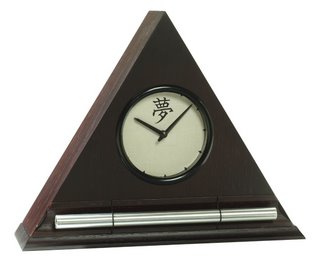 Dream Kanji Zen Alarm Clock with Chime in Dark Oak Finish
Now & Zen
1638 Pearl Street
Bouder, CO 80302
Posted in Chime Alarm Clocks, Well-being, Yoga Timer, Zen Timers
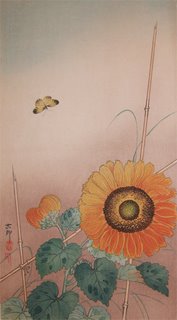 Koson, Small Butterfly And Sunflower - woodblock print Butterfly
sleeping
on the temple bell.
-Buson-
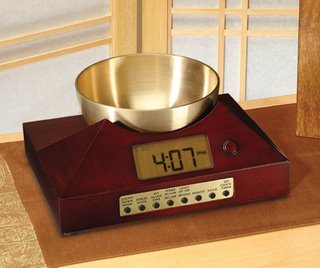 Zen Timers and Bowl/Gong Alarm Clock, Temple Bell Alarm Clock
Now & Zen
1638 Pearl Street
Boulder, CO 80302
Posted in Japanese Poetry, Meditation Timers, Meditation Tools, mindfulness practice, Natural Awakening, Now & Zen Alarm Clocks, Progressive Awakening, Ukiyo-e, Well-being, Yoga Timer, Yoga Timers by Now & Zen, Zen Timepiece by Now & Zen
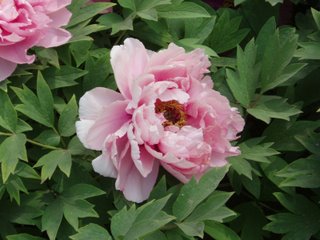 Paeonia Suffruticosa Peonies scattering,
two or three petals
lie on one another.
-buson-
 Zen Chime Clock with Maple Leaves in Honey Finish, progressive awakening clock
Now & Zen
1638 Pearl Street
Boulder, CO 80302
Posted in Bamboo Chime Clocks, Japanese Inspired Zen Clocks, Japanese Poetry, Meditation Timers, Meditation Tools, mindfulness practice, Natural Awakening, Now & Zen Alarm Clocks, Progressive Awakening, Yoga Timer, Zen Timepiece by Now & Zen
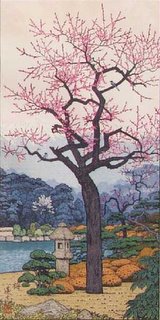 Yoshida, "Plum" woodblock print Moon, plum blossoms,
this, that,
and the day goes.
-Issa-
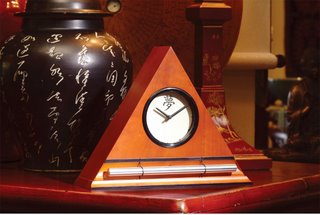 Zen Alarm Clock with Chime and Dream Kanji Dial Face
Now & Zen
1638 Pearl Street
Boulder, CO 80302
Posted in Chime Alarm Clocks, Japanese Inspired Zen Clocks, Meditation Tools, mindfulness practice, Natural Awakening, Now & Zen Alarm Clocks, Progressive Awakening, Well-being, Yoga Timer, Zen Timers
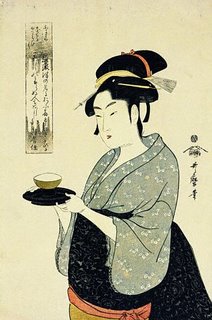 Kitagawa Utamaro Ukiyo-e, wabi-cha Wabi-cha, or wabi-tea, is a style of Japanese Tea Ceremony particularly associated with Sen no Rikyu and Takeno Joo before him. Wabi-cha emphasizes simplicity. The term came into use in the Edo era (1603 to 1868), prior to which it was known as wabi-suki, suki generally referring to the concept of “artistic inclination,” and “wabi” literally meaning ‘forelorn’.
adapted from wikipedia.org
 Zen Chime Clock with Japanese Maple Leaves in Honey Finish Now & Zen
1638 Pearl St.
Boulder, CO 80302
Posted in Bamboo Chime Clocks, Chime Alarm Clocks, Japanese Inspired Zen Clocks, Meditation Timers, Meditation Tools, mindfulness practice, Natural Awakening, Now & Zen Alarm Clocks, Progressive Awakening, Yoga Timer, Yoga Timers by Now & Zen, Zen Timers
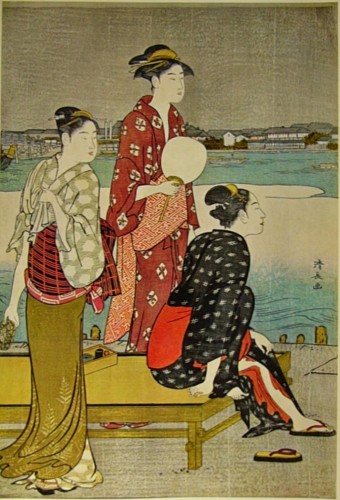 Kiyonaga Riverside Ukiyo-e The phrase iki is generally used in Japanese culture to describe qualities that are aesthetically appealing and when applied to a person, what they do, or have, constitutes a high compliment.
Iki is not found in nature. While similar to wabi-sabi in that it disregards perfection, iki is a broad term that encompasses various characteristics related to refinement with flair.
The tasteful manifestation of sensuality can be iki.
Etymologically, iki has a root that means pure and unadulterated. However, it also carries a connotation of having an appetite for life. Iki is never cute.
The basis of iki is thought to have formed among urbane commoners (chonin) in Edo in the Tokugawa period (1603 to 1868). Iki is sometimes misunderstood as simply “anything Japanese”, but it is actually a specific aesthetic ideal, distinct from more ethereal notions of transcendence or poverty. As such, samuri, for example, would typically, as a class, be considered devoid of iki, (see yabo).
At the same time, individualistic warriors are often depicted in contemporary popular imagination as embodying the iki ideals of a clear, stylish manner and blunt, unwavering directness. The term became widespread in modern intellectual circles through the book The Structure of “Iki” (1930) by Kuki Sukuzo.
adapted from wikipedia.org
 Digital Zen Timers, a mindfulness practice tool Now & Zen
1638 Pearl Street
Boulder, CO 80302
Posted in Bamboo Chime Clocks, Beauty, Meditation Tools, mindfulness practice, Natural Awakening, Now & Zen Alarm Clocks, Progressive Awakening, wabi-sabi, Yoga Timer, Zen Timers
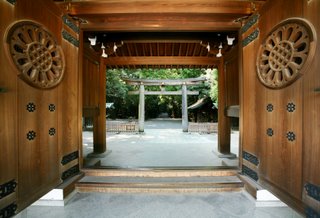 torii gate, Meiji-jingu Shrine, Japan A torii is a traditional Japanese gate most commonly found at the entrance or within a Shinto shrine, where it symbolically marks the transition from the sacred to the profane. The presence of a torii at the entrance is usually the simplest way to identify Shinto shrines, and a small torii icon represents them on Japanese road maps. They are however a common sight at Japanese Buddhist temples too, where they stand at the entrance of the temple’s own shrine, called chinjusha and usually very small.
adapted from wikipedia.org
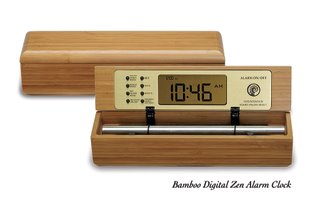 Bamboo Zen Timers, a meditation tool Now & Zen
1638 Pearl Street
Boulder, CO 80302
Posted in Bamboo Chime Clocks, Chime Alarm Clocks, Japanese Inspired Zen Clocks, Yoga Timer, Zen Timers
 creating water gardens, a mindfulness practice One mindfulness practice we enjoy is to create a water garden. It can be calming to find rocks and create a special space for meditation.
Finding a good placement of rocks is similar to arranging a Zen garden or Japanese rock garden. Well-done, intuitive placement of rocks can stimulate a feeling of peace or Zen while also achieving a practical effect.
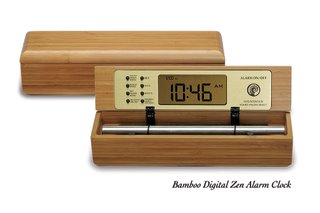 Bamboo Zen Clock, a meditation timer
Now & Zen
1638 Pearl Street
Boulder, CO 80302
Posted in Japanese Inspired Zen Clocks, Meditation Timers, Meditation Tools, mindfulness practice, Well-being, Yoga Timer, Zen Gardens, Zen Timers
 calm the mind, zen timers by Now & Zen, Boulder, CO In Medtitation everyone most likely experiences two of the five hindrances. They are boredom, which is half-hearted action with little or no collectedness and restlessness-worry, which is the inability to calm the mind.
The first three enlightment factors (mindfulness, investigation, energy) are to be used when experiencing boredom to regain collection, the last three enlightment factors (tranquillity, collection, equanimity) are to be used when experiencing restlessness and worry to regain collectedness.
adapted from wikipedia.org
 Bamboo Zen Timers, a meditation tool Now & Zen
1638 Pearl Street
Boulder, CO 80302
(800) 779-6383
Posted in Bamboo Chime Clocks, Chime Alarm Clocks, Japanese Inspired Zen Clocks, Meditation Timers, Meditation Tools, mindfulness practice, Natural Awakening, Now & Zen Alarm Clocks, Yoga Timer, Yoga Timers by Now & Zen
« Previous Page — « Previous Entries
Next Entries » — Next Page »
|
|
|
|